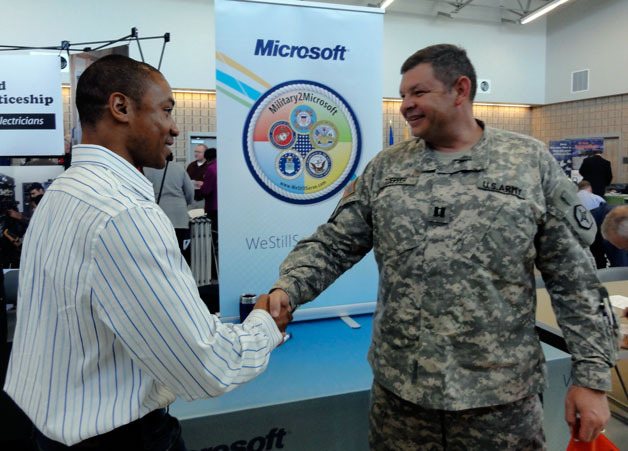MARYSVILLE — The Marysville Armed Forces Reserve Center is still a ways away from its official dedication, but the recently constructed facility is already serving those who serve.
Military members from Marysville, Arlington and beyond were able to meet local employers and distribute their resumes at the Snohomish County Regional Veterans’ Job and Resource Fair on Nov. 8, jointly presented by the Fleet & Family Support Program and WorkSource of Snohomish County.
Petty Officer 2nd Class Kevin Buckley is assigned to Naval Station Everett and lives in Arlington. As a radar technician, the 14-year enlisted sailor was looking for an employer that could apply his service skills to the civilian sector.
“Companies that come to a military job fair have a better understanding of what we do,” Buckley said, after talking to representatives of Esterline Technologies. “We bring more to the table than just our technical backgrounds. The life of a sailor often means hard days in an industrial environment.”
Buckley brought only a dozen copies of his resume to the job fair. Rather than blanketing employers with his credentials, he chose only those companies that seemed to fit him best, even as he took care to translate his qualifications into civilian terms.
“It can be a challenge because we’re a unique subset of society,” Buckley said. “We have our own shared experiences, and we tend to communicate in jargon.”
Army Capt. Allen Toepfer, an administrative officer for the 364th Expeditionary Sustainment Command (Rear), is stationed in Marysville after being deployed to Iraq. Between active-duty, reserve and inactive time, it’s been 18 years since he first donned a uniform. Rather than attending the job fair for himself, he was more concerned with bringing back information for some of his troops who were unable to fit it into their schedules.
“A couple of these programs will greatly assist soldiers transitioning back to civilian life,” Toepfer said. “The two that most surprised me were the carpentry and technical programs.”
Like Buckley, Toepfer hopes to see more civilian employers taking a fuller account of military members’ employable assets.
“One of my soldiers was given the position of scheduling all flights for equipment, personnel and supplies while we were [in Iraq],” Toepfer said. “The last time I called him, in 2010, he was working for a mechanic. That logistics background should be useful in managing, scheduling or supplying a small business or corporation, yet it isn’t even considered.”
Toepfer argued that soldiers he served with Iraq should be considered for prison guard jobs after working with detainees, and one would have done well as a 911 dispatcher after serving as a radio dispatcher for his brigade.
“He dealt with crisis situations and had to maintain a calm and focused frame of mind at all times,” Toepfer said. “Yet he can’t use that experience to find anything but work as a part-time shelf stocker. How does one pick up from this to go back to pumping gas at the local gas station, with some of the best experience we have received in life simply left by the wayside?”
George Johnson, of the Fleet & Family Support Center at Naval Station Everett, believes the job fair achieved a mutually beneficial balance between employers and job seekers.
“We’ve gotten very positive feedback,” Johnson said. “Unlike the impersonality of job searching on the Internet, they get to look each other in the eye, and the folks in the civilian world can learn that the battlefield is only one part of what these people can do.”



